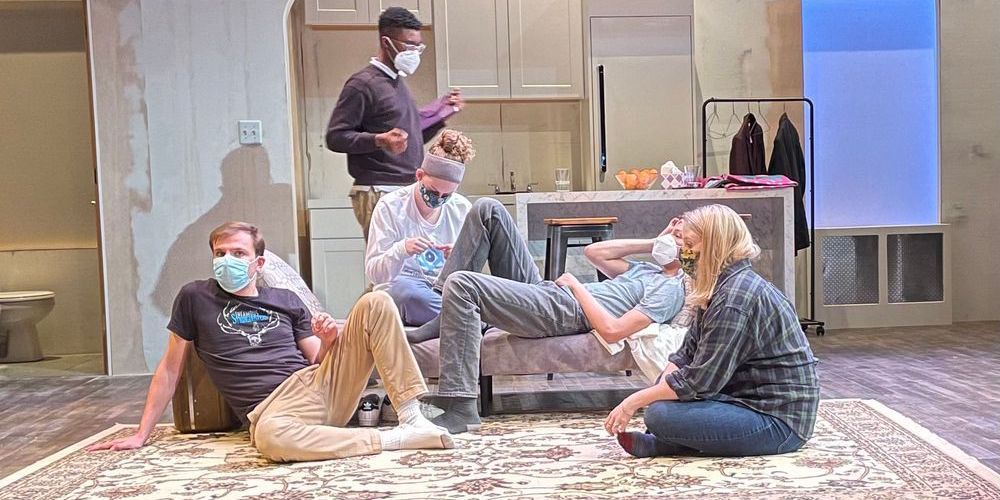"Bad Jews," Good Play: Senior Theatre Thesis Thrills
Emma Ratshin '22E's senior thesis "Bad Jews" was performed last weekend, providing a provocative and dark examination of family, religious identity, and community. Assistant opinion editor Tapti Sen '25 breaks down the play and its brilliantly difficult characters.


As the lights dim in Holden Theater and the audience’s whispers fade away, a man sits on a couch in a modern apartment, playing a video game the audience cannot see. Several seconds of silence follow, broken by the door opening. A woman enters, asking why her cousin is sitting in his boxers after their grandfather’s funeral.
This is the opening to “Bad Jews,” a dark comedic play by Joshua Harmon, presented at Amherst last weekend as Emma Ratshin ’22E’s senior thesis. It tells the story of three cousins trying to decide who should receive their recently passed grandfather’s heirloom, a Chai necklace that is deeply important to their Jewish family’s history (their grandfather recounts having hid the necklace under his tongue for years during the Holocaust).
The cast of the play is relatively small, consisting of the three cousins, Daphna/Diana (played by Ratshin), Jonah (Miles Garcia ’25), and Liam (Eli Quastler ’22E), as well as Liam’s girlfriend Melody (Caroline Seitz ’22). These four actors do an amazing job in creating the scene of the play and establishing a fascinating family dynamic. The play takes place almost in real time over one night in these four people’s lives. Even within just that one night, we get an amazing insight into these four characters and their complicated relationships.
Simply put, “Bad Jews” is like watching a trainwreck unfold slowly and surely, but in an amazing way. Most of the play consists of arguments between the characters, and that is where we truly see the actors shine: their performances are loud and emotional, effectively capturing the audience’s attention while also managing to jolt us in our seats. I personally still shudder when thinking about Liam’s “Shut the fuck up!” to Daphna, a defining moment in the play where Quastler reaches the highest decibel I’ve heard from an actor on stage so far. The story primarily being told through arguments and the nearly tangible tension between the characters made the play very stressful to watch — I was hanging onto every word during the last 40 minutes of the play. When the play ended in the same quiet way it began — a man on a couch playing video games —, I was surprised, feeling as though it had been left unfinished somehow. And yet, that was the ultimate point of the play: a conflict set this deep cannot be resolved over the course of one night.
Snigdha Ranjan ’25, assistant stage manager for the play, described her experience working on the crew: “It was simply amazing. The cast was amazing, the director was amazing, and my fellow crew was amazing too. The cast and crew was all very responsible and communicated really well, and overall, I’m really happy I got to be a part of this production.”
The central conflict of Bad Jews is centered around Daphna and Liam’s opposite approaches to their religion: Daphna, who feels deeply connected to her religious identity and cultural history, is a devout Jew, while Liam is an atheist who distances himself greatly from his family’s Jewish identity. However, the most effective aspect of “Bad Jews” is that the audience is truly not on anyone’s side — mostly because both of these characters are deeply flawed people. Daphna takes her religiosity to extremes, claiming that Liam marrying a non-Jewish person is ruining their culture and otherwise is portrayed as a straw feminist. Meanwhile, Liam is incredibly rude to his brother and family alike (90 percent of the loud yelling is from him), and to be honest, the only person he’s a vaguely decent human being to is his girlfriend Melody. (We are led to feel a lot of sympathy for Jonah and Melody, who are mostly caught in-between the arguments of the other two characters, although there is plenty to say about them as well.) In the conversations and arguments that occur between Daphna and Liam, we explore questions of identity, of what it means to be Jewish and of what role religion should play in our lives. Along the way, we’re also encouraged to think about how our cultural heritages shape us and what it means to be a member of a community.
Anyone who has dealt with any of those issues will find themselves pondering these questions after the play — I know that I certainly did. I feel as though American media usually shys away from conversations regarding religion and especially about the conflicting ideas within certain religions. That makes it extremely refreshing that not only does the play embrace exploring those intra-religious conflicts, the actors do too. They have constructed their characters in a way that makes their personas terribly, terribly unlikeable, and at the same time, terribly, terribly human. When I came out of the theater, I realized how apt the title is, because no matter whose points you agree with more, and who you think really deserves the Chai, the characters are all, in each other’s eyes, bad Jews.





Comments ()